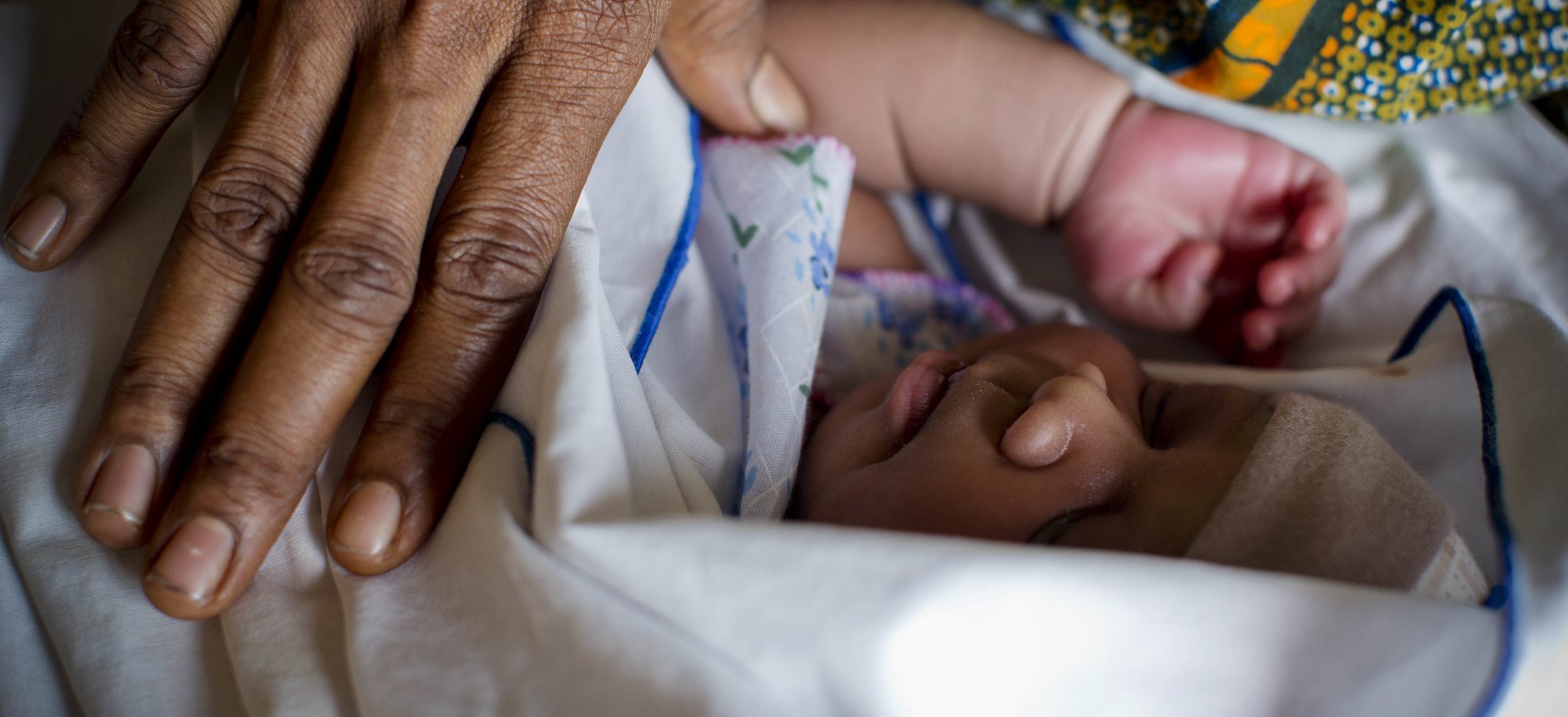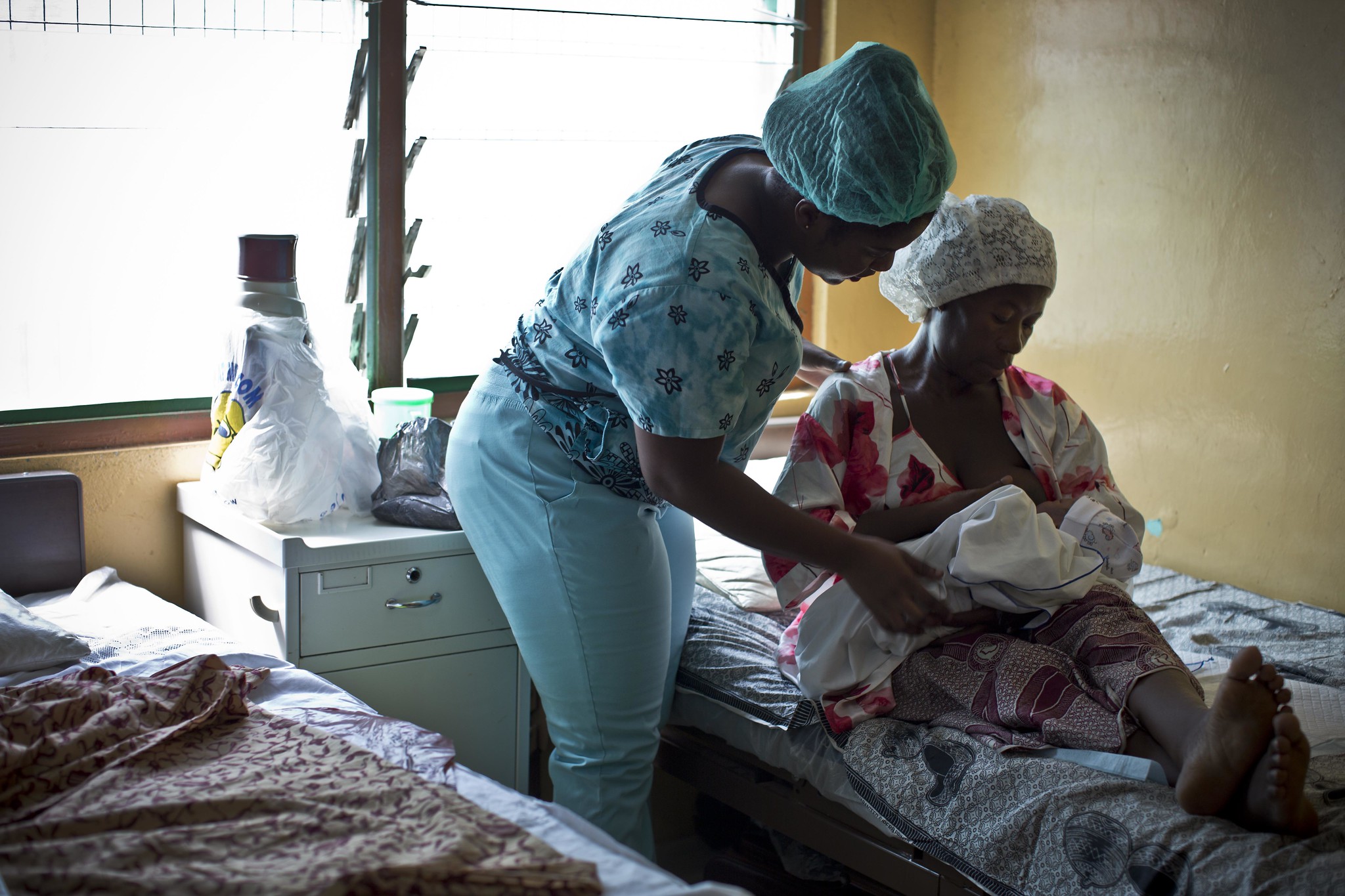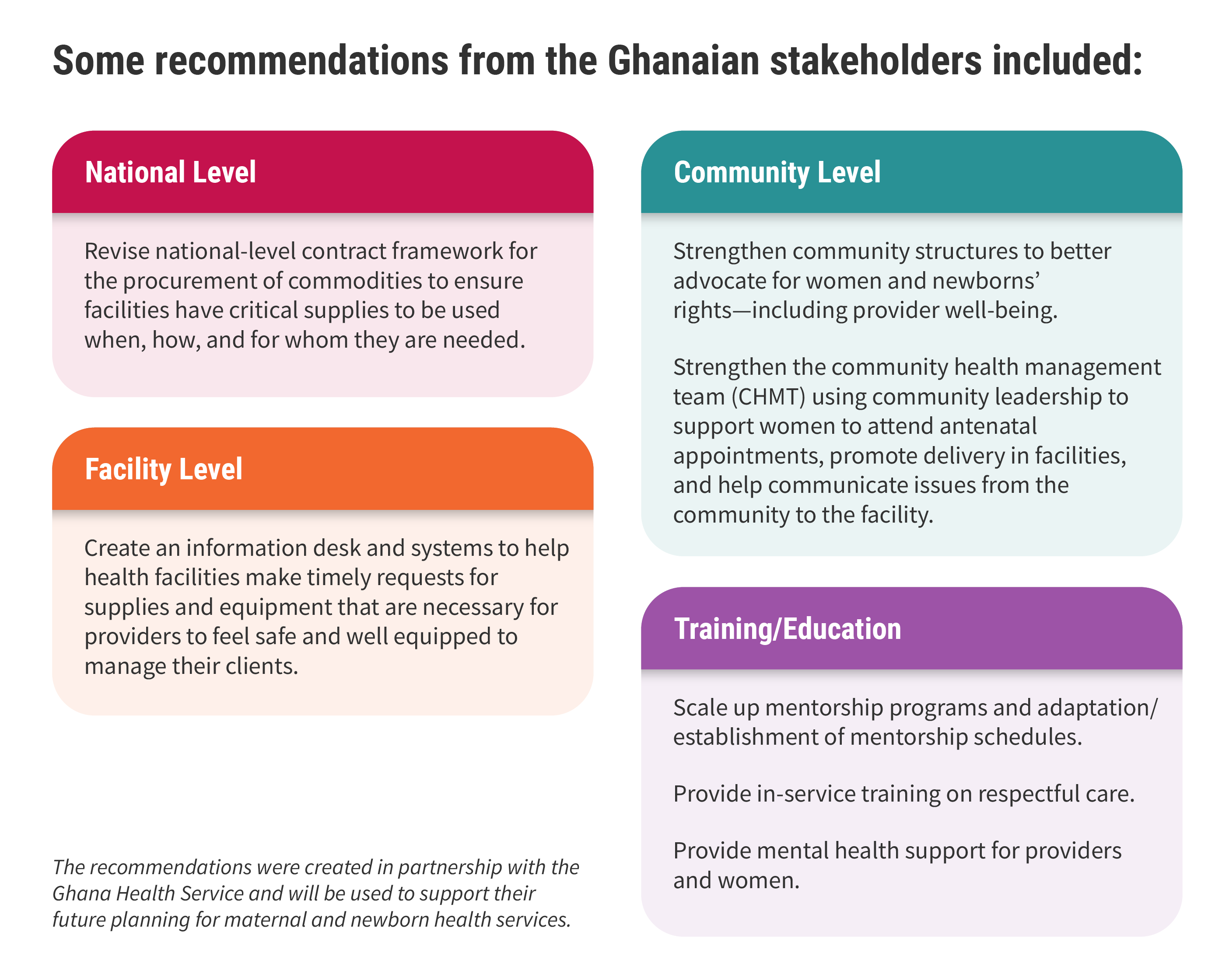Expanding Respectful Care Beyond Delivery: The Newborn Experience
Published on August 21, 2024

By Shanon McNab, with contributions from Elizabeth Acheampong, Cupid Adumbireh, Ana Petricel, Susan Moffson, Neena Khadka Basnet, and Suzanne Stalls (MOMENTUM Country and Global Leadership); and Colby Reed, Lara Vaz, and Reshma Naik (MOMENTUM Knowledge Accelerator)
This blog, part of a series on patient experience of care, highlights insights, reflections, and resources related to the newborn experience. Visit the MOMENTUM website to read other blogs in the series and learn more about how insights from MOMENTUM’s experience of care work may apply to you.
A woman’s experience of care during childbirth shapes both how she sees herself as a new mother and her level of trust in the health system. According to the World Health Organization, experience of care while giving birth is a key component of quality of care, and a positive experience is characterized by effective communication, respect and dignity, and emotional support.
The right to dignity and respect during childbirth is a right for all women.1-5 While respectful maternity care (RMC) has historically focused on childbirth and the immediate postpartum period, there is increasing recognition that respect should transcend these boundaries. MOMENTUM Country and Global Leadership has been working to expand the understanding of respectful care across the continuum of care, including newborns, especially small and/or sick newborns. This blog focuses on the importance of the newborn experience of care and provides an in-depth look at work being done on this front in Ghana.
Why Focus on Experience of Care for Newborns?
The global movement for RMC has made great strides in the last decade. With the inclusion of the experience of care as a core component of quality of care in the World Health Organization’s framework for improving quality of maternal and newborn care, there has been a push at global, national, and sub-national levels to promote respectful care and address mistreatment in the health system.
While the focus on respectful care has traditionally been on the woman alone, there is growing awareness that mistreatment of newborns can have immediate and lasting consequences. There is a growing movement to expand the focus to the woman and her baby together—the dyad—and to include respectful newborn care.
The importance of respectful newborn care has been highlighted in a myriad of ways, including a pivotal publication in 2017 defining disrespect and abuse of newborns and the 2021 World Health Organization brief Nurturing Care for Every Newborn. Additionally, in 2019, the White Ribbon Alliance included newborns in the Respectful Maternity Care (RMC) Charter, leading to several articles delving into the definition of respectful newborn care, the role of communication between providers and families, and methods of measurement.
Newborns must be respected and acknowledged as individual human beings. During the most vulnerable period of life, newborns have specific needs for respectful and compassionate care so they can grow to their full potential. The mistreatment of women and newborns is linked; for example, unnecessary separation of the dyad can prevent skin-to-skin contact and hinder early initiation of exclusive breastfeeding.2 There are also negative experiences that are specific to the newborn, such as shaking or slapping, immersion in cold water for resuscitation, suctioning without medical indication, or neglected hygiene measures.
For small and/or sick newborns, care in a health facility is life saving. Yet respectful care can be further compromised in such settings. When admitted to a newborn unit, the baby is separated from the mother and family, potentially harming their neurodevelopment. In addition, a noisy environment, bright lights, painful procedures, and lack of nurturing touch can deprive the newborn of a healing sensory environment that creates toxic stress affecting their mental health and development.6 Giving all newborns, especially those who are small and/or sick, their own rights has been an ongoing goal of the RMC community, and one with room for further growth.7
Newborn experience of care is difficult to determine—unable to talk, babies cannot describe what they are feeling or how they are being treated. When newborns do communicate their pain in subtle ways, parents may not be aware of those cues. Newborn health providers are not always aware of the effects that their well-intended medical interventions may have when provided in an unfavorable nurturing environment. It is often up to mothers and families to raise concerns about newborns’ care. However, they may not always have a full understanding about how or why their child is receiving care or how they should be treated. Mothers may also be disempowered and unable to speak up to, or question, health providers. Often, the issue of newborn rights is not clearly articulated to parents or providers, creating ambiguities that can lead to further mistrust and perceptions of mistreatment.
Moving the Needle: MOMENTUM’s Work in Ghana
In Ghana, the MOMENTUM team—in partnership with Navrongo Health Research Centre (NHRC)—is working to better understand newborns’ experience of care, and particularly the specific needs of small and/or sick newborns, as part of its overall efforts to help strengthen Ghana’s health system for mothers and newborns.
In 2023, MOMENTUM Country and Global Leadership and NHRC conducted a mixed-methods study in the Upper West and North East regions of Ghana. The team engaged women, health providers, mothers of small and/or sick newborns, health managers, and civil society organizations by conducting 434 individual surveys, 75 in-depth interviews, and four focus groups.

The study revealed that despite good intentions, facility-level challenges often prevent providers from delivering the respectful care newborns deserve. Providers described small nurseries where small and sick newborns were kept, limited parental visitation, harmful practices such as holding newborns upside down, a lack of resting areas for families, and frequent staffing shortages. Women echoed these concerns, and also expressed fears about their babies’ whereabouts and their treatment during prolonged separations. Women and newborns were affected by many similar health systems issues related to infrastructure, supplies and equipment, staffing mix and skills, enabling environments, and informed and engaged communities. The concern around providers’ well-being also became clear; providers were struggling with their mental health, impacting their ability to support women and newborns as they wanted.
Additionally, women felt uninformed about the medical interventions their newborns were receiving and their purpose. Both women and providers also struggled to consider the newborn’s perspective; they were often unaware of how harsh elements like needle pricks, loud noises, and bright rooms affect newborns. They also found it challenging to articulate and define what constitutes respectful newborn care.
These findings, among others, informed a co-design process during which a diverse set of stakeholders—including Ghana Health Service (GHS) officials, community leaders, women, religious leaders, teachers, midwives, doctors, facility managers, and representatives from professional associations—drafted a list of proposed interventions to improve the experience of care for women and newborns. During a 1.5-day workshop across four locations in Ghana, stakeholders reviewed study findings, identified newborn mistreatment issues and their root causes, and devised specific solutions for women, newborns, and health providers.
Stakeholders adopted a shared vision statement to guide their process: “A health system where all women, newborns, and their families have access to high-quality, respectful, and dignified care delivered by motivated staff in well-resourced facilities in Ghana by 2030.” Their recommendations, targeting each level of the health system, were based on a common understanding of the challenges facing women and providers.

The co-design concept—and its inclusion of key stakeholders, including women and families, at all levels—is a key strategy to promote community- facility- and sub-national-level discussions on the newborn experience of care and the importance of the mother-baby dyad. In our example from Ghana, religious leaders, who often serve as initial points of contact for families for information, support, and guidance, were able to provide insights on how to link communities with health facilities in ways that would be perceived as safe and trustworthy.
The Ghana experience and global evidence show that this type of participatory process is effective because it engages key local actors that can influence their communities to build cooperative relationships with health facilities.

What More Is Needed?
As the maternal and newborn health community continues to expand the understanding of RMC beyond childbirth, there are areas where direct action could be taken for including newborns in the continuum of care. Health policies need to explicitly name the rights of newborns; facilities need appropriate staffing to support newborns alongside women; quality improvement initiatives should consider women’s and newborn’s experiences of care together; nurturing care that is infant and family centered should be available for all newborns and should include a positive sensory healing environment; and measurement efforts should be complementary and not duplicative. Countries that have adopted Every Newborn Action Plan (ENAP)/ Ending Preventable Maternal Mortality (EPMM) targets, as Ghana has in their Reproductive, Maternal, Newborn, Child, Adolescent Health and Nutrition (RMNCAHN) strategic plan, should also continue to prioritize the dyad in their maternal and newborn health programming and advocacy.
More data are needed in other areas too, including evidence on how newborns perceive and experience their environment and the effect on their long-term outcomes. More research on practical implementation of reproductive, maternal, and newborn care (RMNC) is also needed. While the concept has been defined, we are only beginning to understand how best to implement interventions to improve respectful care for newborns in a variety of settings.
MOMENTUM looks forward to continuing to help move the respectful maternal and newborn care movement forward in a way that is participatory and evidence-based—and that results in real improvements in the experience of care for women and newborns.
To learn more about newborn experience of care, check out these useful resources:
- People-centered Care Framework and Intersections with Respectful Maternity Care, Rights-based Care, and Nurturing Care (USAID MOMENTUM Global Country Leadership)
- WHO recommendations: intrapartum care for a positive childbirth experience (World Health Organization)
- Standards for improving quality of maternal and newborn care in health facilities (World Health Organization)
- Defining disrespect and abuse of newborns: a review of the evidence and an expanded typology of respectful maternity care (Sacks, E./Reprod Health)
- Respectful Maternity Care (RMC) Charter (White Ribbon Alliance)
- Nurturing care for every newborn: thematic brief (WHO)
References
- UN General Assembly. Universal Declaration of Human Rights. UN General Assembly; 1948 Dec. 7.
- UN General Assembly. Declaration on the Elimination of Violence against Women.
- UN General Assembly; 1993 Dec. 8. UN General Assembly. International Covenant on Economic, Social and Cultural Rights. UN General Assembly; 1976 Jan. 9.
- White Ribbon Alliance. Respectful Maternity Care: The Universal Rights of Childbearing Women [Internet]. Washington DC: White Ribbon Alliance; 2011 Oct. Available from: http://whiteribbonalliance.org/wp-content/uploads/2013/10/Final_RMC_Charter.pdf
- Office of the United Nations High Commissioner for Human Rights. Technical guidance on the application of a human rights based approach to the implementation of policies and programmes to reduce preventable maternal morbidity and mortality. UN General Assembly; 2012 Jul
- Roofthooft DW, Simons SH, Anand KJ, Tibboel D, van Dijk M. Eight years later, are we still hurting newborn infants? Neonatology. 2014;105(3):218-26. doi: 10.1159/000357207. Epub 2014 Feb 4. PMID: 24503902.
- World Health Organization & United Nations Children’s Fund (UNICEF). (2021). Nurturing care for every newborn: thematic brief. World Health Organization. https://iris.who.int/handle/10665/345297. License: CC BY-NC-SA 3.0 IGO

